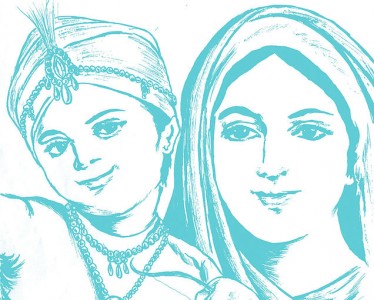Personal Reflection – Guru Gobind Singh Snatam Kaur
This article is courtesy of Snatam Kaur’s blog
 April 19, 2016: Khālsā is a very universal consciousness of purity, and I feel that there are many paths to it. From this place of reverence, I share with you a story from the childhood of Gurū Gobind Singh, that illustrates the kind of healing available to us within the path of Sikh Dharma.
April 19, 2016: Khālsā is a very universal consciousness of purity, and I feel that there are many paths to it. From this place of reverence, I share with you a story from the childhood of Gurū Gobind Singh, that illustrates the kind of healing available to us within the path of Sikh Dharma.
Gurū Gobind Singh was born to Mātā Gujarī, and the ninth Gurū, Gurū Teg Bahādur in a then small town called Patna located in Northern India. Gurū Teg Bahādur travelled a lot at that time to fulfill his mission and service to humanity. At home, Mātā Gujarī raised her lively, sweet, saintly and sometimes mischievous son on her own for the early part of his life. Known at that time as Gobind Rai, as a young child he would often run about with his friends in the village and nearby fields with various games and fun adventures.
Near the family home lived an old lady, who for the most part was quite unhappy. Her life had been hard, as things had happened to her, and she had acted in ways that she was not entirely happy with. She was doing her best to support herself by spinning wool to make yarn, which she sold in the market. However, a heavy energy seemed to always be with her, and she was often seen with a grumpy frown on her face, going about her work in her run down little hut. She would always yell at the children if they got to close to her hut, as the noise disturbed her. One day, in a spark of mischief, Gobind Rai ran into her hut and grabbed one of her balls of yarn that had been stacked on a shelf, and rolled the yarn into the dirt covered courtyard in front of the hut. With squeals of laughter, he ran off.
The old lady was so angry but could not run after him. She just picked up the dirty and ruined yarn and yelled out in frustration, “How dare you! I will have a word with your mother!”
She went straight away to the Gurūs house, and knocked on the door. Mata Gujarī answered, and upon hearing what had happened, took her inside. She was used to hearing about her son’s mischief. So she said to the lady,
“He is the son of the Gurū, and I do not know sometimes why he is so mischievous. There is such a light of love that always flows through him. Please have a cup of tea and accept this money to pay for your yarn!”
The old woman accepted at first with some annoyance. But, then, as she stayed for sometime she began to relax and feel something good inside that she had not felt for quite awhile. While Mātā Gujarī prepared the old woman’s tea she chanted the Gurū’s Bānī, or song. While the old woman was drinking her tea, someone else in another room began chanting. This vibration was always permeating their home and quite normal for the family, but indeed very new for the old woman. It was a beautiful space to be in and she relaxed and enjoyed her tea. She thought to herself, “Oh he was a mischievous boy! But, certainly he will not do it again.”
The very next day, as the old lady sat down to her work she was back to her old grumpy self, yelling at the children to get away from her yard. With a flash of light sparkling from his eyes Gobind Rai dashed in, grabbed another ball of yarn, and set it rolling into the dirt and ran away laughing. Again the old lady went to the Gurū’s house, furious. Mātā Gurjarī invited her in and as the sacred Bānī, or song of the Gurū was being sung in the home, the old lady sat and felt relaxed and joyful.
This pattern repeated for many days. In this way the old lady became a frequent visitor to the Gurū’s home and something in her began to change.
Through the vibration of the Shabad Gurū and the company of the holy, or Sangat, her karmas (energetic results of past actions) began to loosen and she found a deep sense of healing. Soon she was much more relaxed, and even felt happy about herself and her life. Although the young boy Gobind Rai had at first appeared mischievous, he reached out to her in the wisdom of the Gurū that he would become and brought her into the sacred vibration that would heal her forever.
With this, I leave you with these sacred words of Gurū Gobind Singh, the last four lines of Jāp Sāhib. Yogi Bhajan Siri Singh Sahib taught us that this mantra removes fear, anxiety, depression, and phobias, and brings victory. It instills courage and fearlessness into the fiber of the person. It gives “sāhibī”- self-command and self-grace. I will be teaching a workshop with Pritpal Singh at Sat Nam Fest West about this mantra. Please see the link below if you wish to join us in person. Also please enjoy the musical version of this mantra by using the link below. By chanting these sacred words, this energy light and love that was so naturally in Gobind Rai as a young boy, and then which became evident to the world when he became Gurū Gobind Singh, this same energy can be with us too. Enjoy!
~ Snatam Kaur
![]() chattar chakkar varati chattar chakkar bhugatay
chattar chakkar varati chattar chakkar bhugatay
In the four directions God is pervading, In the four directions God is enjoying.
suyambhav subhang sarabada sarab jugatay
Self-Existent. Self-Illumined. United with all beings everywhere.
dukalang parnasi di-alang sarupay
Destroyer of the pains of reincarnation. Embodiment of Compassion.
sada ang sangay abhangang bibhutay
God is always with us, life and limb. God’s glorious grandeur is everlasting.
This article is courtesy of Snatam Kaur’s blog. Visit her blog to view more
Listen to Snatam Kaur’s recording of this Shabad from her album “Ras”






